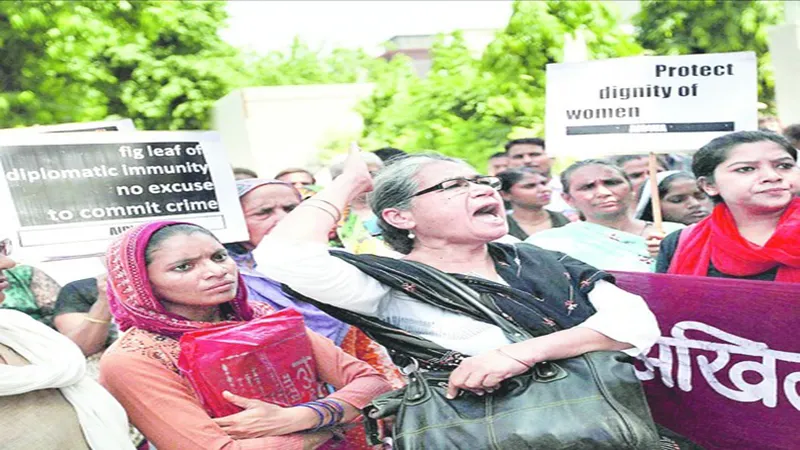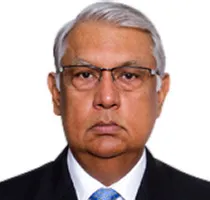"At a time when the Islamic State has openly instituted the practice of sexual slavery by auctioning girls and women, mostly non-Muslims in Iraq and Syria, the allegations of rape and sexual slavery against a Delhi-based diplomat of Saudi Arabia, living in a luxury flat in Gurgaon, a satellite town of Delhi, have again brought the issue of abuse of diplomatic immunity and its ramifications under intense scrutiny. According to the version given out by the maids during their interrogation by the police, the Saudi diplomat allegedly ""bought"" two Nepali women from an agent - basically a trafficker - to serve as maids in his home and allegedly subjected them to torture and rape, including ""unnatural"" sex, by multiple friends of the diplomat. Both maids had suffered during the massive earthquake in Nepal and were desperate to get jobs. This led them into the clutches of traffickers in Kathmandu and Delhi.
The Nepali maids were taken for two weeks to Saudi Arabia, where they worked in the diplomat's home, but were not subjected to the kind of alleged brutality while in India. The Saudi diplomat must have been mindful of the fact that he did not enjoy any diplomatic immunity in his home country where stringent Sharia laws apply. The crime of rape in Saudi Arabia can attract punishment ranging from public lashings to public beheading. Under Saudi Arabia's Sharia law, the rape victim is also treated harshly under "" Hudood"" laws and sometimes subjected to punishment, if she is judged to have violated guardianship laws or purdah. This could turn into a situation where a rape victim is treated as a criminal and the rapist goes scot free because four male eye witnesses are required to testify that rape took place.
The trafficking mafia in the subcontinent is extremely powerful, with high-level contacts and patronage. Human trafficking is rampant across all countries, with Bangladesh, India, Nepal and Sri Lanka as the main recruiting ground for the traffickers. Women and children constitute an important and lucrative source for the trafficking mafia. The other major items of the smuggling and trafficking mafia are cattle, mainly from India to Bangladesh, and sundry items of tradable goods that are in demand in India's neighbourhood. Some neighbouring countries are conduits for the smuggling of Chinese goods and fake Indian currency. Apart from destinations in India (usually brothels in major cities), many women are trafficked also to Pakistan, largely for the same purpose. Many women are trafficked to the rich Arab nations of the Gulf where they are put to work as maids and prostitutes, subjected to ill-treatment and virtually slave-like working conditions, without any recourse to justice and fair treatment.
The oil-rich Arab nations have amassed wealth and their nationals do not wish to work in service jobs themselves. They can afford to bring in expatriate labour from all countries. Those who do menial labour are usually from the subcontinent. There are over seven million Indian citizens working in the Gulf countries with around three million in Saudi Arabia alone. It must be said that problems of ill-treatment by Arab employers do happen, but there is no evidence for making sweeping generalizations about ill-treatment. If it was so rampant, whimsical and unregulated, such large numbers of Indians could not have sustained themselves in their workplaces in these countries. Moreover, they value their jobs for sustaining their families in India. It is their money that contributes to the billions of dollars that flow into India as remittances. The Indian diaspora worldwide contributes around 70 billion dollars in inward remittances, making India the largest recipient of foreign remittance in the world, followed by China. There is little doubt that Indians work in difficult conditions and live in cramped accommodation in many of the Arab Gulf countries and elsewhere. Indian missions in these countries have been tasked for quite some time to investigate and assist Indian workers in their disputes and other problems, which may relate to wages, poor living conditions and other issues.
Diplomatic immunities and privileges have grown out of the need to protect envoys of a sending country to reside in the territory of another country that is the receiving State. In ancient times, kingdoms exchanged envoys who were sometimes murdered when relations turned hostile. Modern diplomatic immunities and privileges have grown out of customary law and practices from about the 1500 CE, when European States started the practice of exchanging resident ambassadors. There was no commonly accepted norm of diplomatic immunities and privileges although bilateral practices among European States built a body of customary rules that started being adopted by many States in Europe.
The essence of such immunities and privileges stems from the need to protect a diplomat working in another country, sometimes hostile, from harassment, arrest, detention and other impediments in the performance of his or her duties, which the sending State tasks the diplomat to do. In short, such immunities basically mean, ""Don't shoot the messenger."" Another crucial underpinning of diplomatic immunities and privileges is reciprocity: countries agree to treat one another's diplomats respectfully, and provide them protection through immunities and privileges. It is kind of a mutual hostage situation (to put it crudely), with the underlying implication that if you cause trouble for my diplomat then I can retaliate against yours. This acts as a deterrent and restrains States from violating the Convention.
The codification of diplomatic immunities and privileges took place under the aegis of the United Nations resulting in the Vienna Convention on Diplomatic Relations in 1961 and the collateral agreement, Vienna Convention on Consular Relations in 1963. Almost all countries today are signatories to these conventions and have ratified them. The 1961 Convention begins by saying, ""The States Parties to the present Convention, Recalling that peoples of all nations from ancient times have recognized the status of diplomatic agents..."". A very important aspect of the convention is Article 41, which states inter alia, ""Without prejudice to their privileges and immunities, it is the duty of all persons enjoying such privileges and immunities to respect the laws and regulations of the receiving State. They also have a duty not to interfere in the internal affairs of that State.""
The convention is, therefore, clear that diplomats have to obey local laws and regulations and not violate them. Although the implication is that such a violation will make them liable for action, in practice immunities and privileges protect diplomats from criminal jurisdiction of the receiving State. India is a signatory to both conventions and has ratified them. India's parliament has also adopted legislation, namely the United Nations (Privileges and Immunities) Act, 1947, and the Diplomatic Relations (Vienna Conventions) Act, 1972, to give effect to these international commitments.
There have been many cases of diplomats transgressing and violating laws, including the commission of grave offences. The more serious cases have been those where States themselves violate the Vienna Convention. One such case was the attack and occupation of the American embassy in Tehran in 1979, after the fall of the Shah regime when Ayatollah Khomeini came to power. American diplomats and staff were taken hostage by revolutionary students, forcing the United States of America to appeal to the International Court of Justice. The ICJ, in its ruling, held that Iran had violated the Vienna Conventions and held Iran responsible for protecting American diplomats, paying reparations and putting those responsible on trial. Iran prevaricated and refused to follow the court's orders. After 444 days of complex negotiations, an agreement was reached with third parties playing mediating roles.
This case was the first after the Vienna Convention came into force that an embassy was invaded and seized, and its personnel taken hostage. The ICJ's judgement reinforced the Vienna Convention and helped build international consensus on the need for all States to observe the convention in letter and spirit. In 1984, another egregious incident took place in London when a young policewoman was killed outside the Libyan Embassy by gunfire from a window in the Embassy. This led to a huge furore and tit-for-tat actions by the United Kingdom and Libya (then under the eccentric and maverick Colonel Gaddafi). UK broke off diplomatic relations and the evacuation of British diplomats and of the Libyans holed up in the London embassy had to be negotiated by the two countries.
No country is immune from such incidents. In 2013, an Indian diplomat posted as deputy consul-general was arrested, handcuffed and strip-searched for ""visa fraud"" by American authorities. The charge was that the diplomat was underpaying her Indian maid. The same US invoked diplomatic immunity when one of the employees of the Central Intelligence Agency shot dead two Pakistanis on a crowded street. The case required the intervention of the president, Barack Obama. Which was the graver crime, murder or paying wages less than the contracted amount? This question becomes irrelevant because all countries usually go a long way to protect their diplomats, regardless of the offence. Incidentally, the Saudi diplomat in Delhi is not the first to have allegedly committed a criminal offence. In 2011, the police had to rescue two Southeast Asian women allegedly enslaved by a Saudi diplomat in London. Then in 2013, two Filipino women had to be rescued from the home of a Saudi diplomat in Washington.
The Indian government will have to handle this case with care, navigating the interests of all concerned, and taking into account India's close neighbour, Nepal. After some initial attempts by the Saudi embassy, the matter must have reached higher levels in Saudi Arabia, as it has done in India with the prime minister's office asking for reports on the case. There is no option for both countries but to negotiate quietly, given the huge stake in maintaining bilateral ties that have grown considerably. The prime minister, Narendra Modi, is expected to visit Saudi Arabia later this year to continue his policy of closer engagement with the Arab Gulf countries. India will have to follow the standard operating procedure and ask for a waiver of immunity, so that the accused Saudi diplomat can be interrogated and the truth established. It seems that this action has already been taken.
There seems to be clinching evidence of the Saudi diplomat's complicity in the crime. It is inconceivable that his wife was not also privy to the crimes. Moreover, other Saudis may be involved, according to the Nepali maids, and they may not be diplomats. They have to be identified, arrested and put on trial. The Saudi government may choose to deny the waiver of immunity, which will then lead to India asking for the diplomat and his family to be sent back. The Saudi government has the option of investigating the crime and taking action against the diplomat. The Indian government can facilitate this by providing the collected evidence to the Saudi authorities. Lastly, the issue of compensation for the two Nepali maids has to be addressed and should not be sidelined.
Courtesy: The Telegraph, September 15, 2015 "
The views expressed above belong to the author(s). ORF research and analyses now available on Telegram! Click here to access our curated content — blogs, longforms and interviews.




 PREV
PREV


